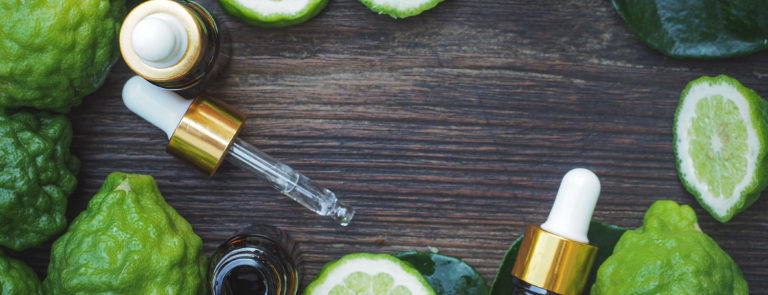10% off £25 OR 15% off £35
Bergamot oil: Benefits, uses & side effects

Essential oils have been used for thousands of years. One of the most popular essential oils is bergamot, but what is it and what can it be used for? 1
The name ‘bergamot’ covers a couple of different plants. We’re probably most familiar with the bergamot citrus fruit (citrus bergamia to give it its official name), which is often used in flavouring and perfumes.2
Meanwhile, the oil and peel from the citrus fruit can be found in many medicines, and may help with high cholesterol levels, among other things.3
What is bergamot?
Bergamot is a citrus fruit plant. We don’t tend to eat bergamot oranges because they taste extremely sour. However, their distinctive taste is often used to flavour all sorts of different food, such as marmalades, baking, cocktails and, of course, tea - the most famous being Earl Grey.4
Bergamot flowers
Bergamot plants produce flowers that have an extremely distinctive look about them. The flower heads consist of several tubular flowers that grow from the centre, creating a shaggy dome of petals. Bergamot flowers appear from early summer right through to early autumn.5
What does bergamot smell like?
Bergamot is characterised by its aromatic scent, which is often described as floral, zesty and tart, and very much similar to the smell of other citrus fruits. Because of this, and the fact it has a spicy edge to it, it features heavily in perfumes, especially because it works well alongside the likes of rosemary, sandalwood, jasmine and vetiver.6
What is bergamot oil?
Bergamot essential oils are extracted from the peel, which is then used for a range of different commercial and at-home purposes. These include perfumes and colognes, soap-making, aromatherapy, and more.8
Bergamot oil is also said to have similar qualities to grapefruit essential oil, in that it’s antiseptic, antispasmodic and analgesic (pain relieving). It has also been linked to potentially helping with skin concerns.
Bergamot oil can be added to water to create a health tonic or applied topically to skin.
However, before you use it, make sure you follow the manufacturer’s guidance and speak to a medical professional first to make sure it’s safe for you to do so.9
8 benefits of bergamot
As well as being used to make delicious tea and flavour a wide range of food, the bergamot fruit has a number of reported benefits and uses.
While bergamot is generally thought to be safe to use, it’s best to speak to your doctor if you have any health concerns.10
Some bergamot benefits might include:11,12,13,14
-
Relieving feelings of anxiety and stress
A 2011 study published in Phytotherapy Research found that bergamot essential oil may help alleviate feelings of anxiety and stress at a biochemical level.
According to the research, mice injected with the anti-anxiety drug Valium (diazepam) displayed lower biomarkers for stress when exposed to the scent of bergamot oil.
They also had lower levels of corticosterone in their bodies, which is the animal version of the stress hormone, cortisol.
-
Preventing and healing skin concerns
A 2019 study in the Open Food Source Journal reported that bergamot oil can neutralise the common bacteria, Staphylococcus aureus, at concentrations of 27 micrograms per millilitres.
At this concentration, it’s believed that bergamot oil is likely safe and possibly effective in preventing minor skin infections.
-
Regulating mood
When used in aromatherapy, bergamot oil has been found to trigger the release of dopamine and serotonin in the brain, key hormones that regulate mood.
Inhaling bergamot oil can stimulate the brain to exert neurotransmitters (e.g. serotonin and dopamine), which helps regulate mood.
-
Managing digestive comfort
Bergamot can reportedly help calm an upset stomach due to its calming properties.
Add 1 to 3 drops of bergamot to a carrier oil, such as jojoba or coconut oil, and massage on to the stomach or drink Earl Grey (which is made from a blend of black tea and bergamot oil), and has long been used to help ease digestive discomfort.
-
Clearing your airways
Herbs and products that have an uplifting aroma, like bergamot, can be useful in helping open up your chest and clear up your senses, similar to the way in which eucalyptus works.
Either put a few drops of bergamot oil in a diffuser and breathe in the scent or rub some on your chest, providing it’s been blended with a carrier oil first. As is the case with all essential oils, never apply neat bergamot oil to your skin because it can cause adverse reactions.
-
Cleansing skin
Bergamot happens have antibacterial and antiseptic qualities, which means you can easily combine it with your hand soap, cleansing gel or moisturiser to give your skin a thorough clean (it also smells nice and fresh too).
-
Lifting your spirits
Remember how we mentioned to you about bergamot’s aroma being zesty, floral and well, just fresh? When you diffuse bergamot or combine it with a carrier oil and rub it into your skin, the citrusy, uplifting burst of freshness it gives off can really help perk you up!
-
Supporting healing
As well as thoroughly cleaning skin and surfaces, bergamot’s antiseptic properties can help support wound healing, cracked skin, ulcers, itching and other forms of skin issues. It may also protects wounds from becoming infected and prevents new infections from forming.
While there is some evidence to back up these bergamot benefits, it’s worth bearing in mind that many of the studies were relatively small and not all of them were conducted on humans.
With that in mind, always speak to your doctor before use. If you already take medication, it could be worth asking if bergamot oil is likely to react with your current medicine or impact any other health concerns you may have.15
8 side effects of bergamot
Bergamot is generally thought to be safe for most people, but it can depend on the way you take it. 16,17 Bergamot oil can be used for bathing, inhaled or applied directly to the skin. You might experience different side effects depending on how you choose to use it.
Bergamot side effects include:18,19
- Skin inflammation – if applied to skin full strength
- Stinging – if applied to skin full strength
- Dizziness
- Muscle cramps
- Heartburn
- Sensitivity to light (photosensitivity)
- Nausea
- Photodermatitis – bergamot contains a substance called bergapten, which is highly phototoxic. If skin has bergamot oil on it and is then exposed to UV radiation from the sun (or a sunbed), it may result in redness, pain, swelling, blistering and rashes.
You should always apply topical bergamot oil with a carrier oil, as using it at full strength could irritate skin and cause allergic reactions.
If you’re not sure about the best way to do this, it may be worth looking for products, such as bergamot body lotions or hair products, to find an option that includes bergamot in a lower dose.
Remember to always follow the label and stop using your chosen product if you notice any side effects.
Bergamot dosage – how much is safe to use?
When applied topically, bergamot oil should be diluted with a cold-pressed carrier oil that ideally contains no more than 0.4% bergamot due to its potential side effects. 20
To make a bergamot massage oil, combine 4-6 drops of bergamot essential oil with 20ml of a cold-pressed carrier oil, lotion or vegetable butter. You can also inhale it by sprinkling some drops on to a cloth or tissue or into a diffuser or vapouriser.
It’s also possible to bathe in bergamot, simply put 4-6 drops into your running bath water.
Note - bergamot oil contains the highest concentration of bergapten of any essential oil. It’s so phototoxic oil that soaking in a bath with a few drops may trigger photosensitivity. To prevent this from happening, carry out a patch test to see how your skin responds to it.21
Takeaway
Bergamot oil has a lot of qualities that are recognised and used on a widespread basis.
It has a citrusy, zesty aroma that features in lots of fragrances and can possibly help lift your spirits.
It also has soothing and cleansing properties that can reportedly help in so many ways too, from managing pain and digestive discomfort, to clearing your senses, cleaning your hands and supporting wound healing.
If you are planning on using bergamot topically, seek medical advice first.
One of the carrier oils bergamot works well with is jojoba oil. For more on jojoba, take a look at this article, ‘What is jojoba oil?’
Last updated: 7 June 2021
- https://www.ncbi.nlm.nih.gov/pmc/articles/PMC4606594/
- https://www.britannica.com/plant/bergamot
- https://www.verywellhealth.com/the-benefits-of-bergamot-essential-oil-88774
- https://www.farmersalmanac.com/what-is-bergamot-30519
- http://www.bbc.co.uk/gardening/plants/plant_finder/plant_pages/8808.shtml
- https://www.fragrancex.com/blog/what-does-bergamot-smell-like/
- https://www.ncbi.nlm.nih.gov/pmc/articles/PMC4345801/
- https://www.ncbi.nlm.nih.gov/pmc/articles/PMC4345801/
- https://www.verywellhealth.com/the-benefits-of-bergamot-essential-oil-88774
- https://www.ncbi.nlm.nih.gov/pmc/articles/PMC5434918
- https://www.verywellhealth.com/the-benefits-of-bergamot-essential-oil-88774
- https://www.fragrancex.com/blog/what-does-bergamot-smell-like/
- https://www.wellandgood.com/exfoliating-solution-chantecaille/
- https://www.organicfacts.net/health-benefits/essential-oils/health-benefits-of-bergamot-essential-oil.html
- https://www.nhs.uk/conditions/herbal-medicines/
- https://www.ncbi.nlm.nih.gov/pmc/articles/PMC6497409/
- https://www.ncbi.nlm.nih.gov/pmc/articles/PMC6392855/
- https://www.webmd.com/vitamins/ai/ingredientmono-142/bergamot
- https://www.verywellhealth.com/the-benefits-of-bergamot-essential-oil-88774
- https://www.verywellhealth.com/the-benefits-of-bergamot-essential-oil-88774
- https://www.verywellhealth.com/the-benefits-of-bergamot-essential-oil-88774













